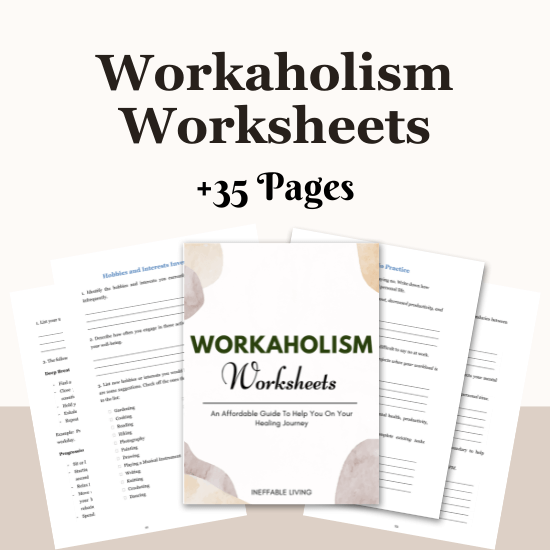In our fast-paced, success-driven society, the line between dedication and obsession with work can sometimes blur.
Workaholism Syndrome, often referred to as work addiction, is a condition where an individual becomes excessively involved in work to the detriment of their personal life and well-being.
This blog post delves into the nature of workaholism, its causes, symptoms, and strategies for achieving a healthier work-life balance.
What is Workaholism Syndrome?
Workaholism Syndrome is characterized by an uncontrollable need to work incessantly.
Unlike those who are simply hardworking or dedicated, workaholics find it difficult to detach from work, often sacrificing personal relationships, leisure activities, and health in the process.
This condition is increasingly recognized as a behavioral addiction, similar to substance addictions, but it revolves around compulsive work behaviors.
Key Characteristics of Workaholism Syndrome
1. Compulsive Need to Work:
– Feeling an irresistible urge to work, even when not required.
– Working long hours, often far beyond what is necessary.
2. Neglect of Personal Life:
– Sacrificing time with family and friends for work.
– Abandoning hobbies and leisure activities.
3. Emotional Dependence:
– Deriving self-worth and identity predominantly from work achievements.
– Feeling anxious, restless, or guilty when not working.
Related: Best 20 Low-Stress Jobs After Retirement
4. Health Consequences:
– Experiencing stress-related health issues such as insomnia, hypertension, and cardiovascular problems.
– Neglecting physical health and wellness due to work commitments.
Causes of Workaholism Syndrome
Workaholism can stem from various factors, including personality traits, cultural influences, and organizational environments. Here are some common causes:
1. Perfectionism:
A desire for perfection can drive individuals to work excessively to meet their own high standards or perceived expectations from others.
2. Escape:
Some individuals use work as a means to escape personal problems or avoid dealing with emotional issues.
3. Cultural and Societal Pressures:
Societies that emphasize achievement, productivity, and success can foster workaholism, valuing long hours and constant availability.
4. Organizational Environment:
Workplaces that reward overwork and long hours can contribute to the development of workaholic behaviors.
5. Personality Traits:
Certain personality traits, such as high conscientiousness, ambition, and competitiveness, may predispose individuals to workaholism.
Related: How Resilience Works? Top 10 Powerful Ways to Stay Healthy and Happy During Tough Times
How to Overcome Workaholism Syndrome?
Achieving a healthy balance between work and personal life is essential for long-term well-being. Here are some strategies to manage workaholism:
1. Acknowledge the Problem
The first step in overcoming workaholism is acknowledging that there is a problem. This involves recognizing the signs of workaholism, such as:
- An inability to detach from work.
- Working excessively long hours, even when not required.
- Feeling guilty or anxious when not working.
- Neglecting personal relationships and self-care.
Acknowledgment is crucial as it sets the foundation for change and recovery. Understanding that workaholism is a form of addiction that requires attention and intervention is a critical first step.
2. Establish Boundaries
Setting and maintaining boundaries is essential for overcoming workaholism. This involves:
– Defining Work Hours: Establish clear work hours and stick to them. Avoid taking work home or working during weekends and vacations.
– Creating a Work-Free Zone: Designate certain areas of your home as work-free zones to create a physical separation between work and personal life.
– Saying No: Learn to say no to additional work commitments that are not essential or can be delegated. Practice asserting your limits respectfully but firmly.
Related: Top 25 Tips On How To Set Boundaries Without Being Controlling? (+FREE Worksheets PDF)
3. Prioritize Self-Care
Self-care is crucial in managing workaholism. It involves:
– Physical Health: Engage in regular exercise, maintain a balanced diet, and ensure you get enough sleep. Physical well-being directly impacts mental and emotional health.
– Mental Health: Practice mindfulness, meditation, or relaxation techniques to manage stress and anxiety. These practices can help you stay present and reduce obsessive thoughts about work.
– Hobbies and Interests: Reconnect with hobbies and interests outside of work. Engaging in activities you enjoy can provide a sense of fulfillment and balance.
4. Reevaluate Personal Goals
Take time to reevaluate your personal and professional goals. Reflect on what truly matters to you and whether your current work habits align with those values. Ask yourself:
- Are your work habits sustainable in the long term?
- What sacrifices are you making, and are they worth it?
- How can you achieve a better work-life balance?
Setting realistic and meaningful goals can help you prioritize what’s important and reduce the compulsion to overwork.
Related: Top 5 Self Love Exercises (+FREE Self-Love Resources)
5. Develop Time Management Skills
Improving time management skills can help you work more efficiently and reduce the need to overwork. Consider the following strategies:
– Prioritization: Focus on high-priority tasks and delegate or postpone less critical ones.
– Scheduling: Use tools like calendars, planners, or time-tracking apps to organize your tasks and manage your time effectively.
– Breaks: Schedule regular breaks throughout the day to rest and recharge. Short breaks can enhance productivity and prevent burnout.
6. Improve Work Relationships
Building healthy work relationships can contribute to a more balanced approach to work. This involves:
– Communication: Communicate openly with colleagues and supervisors about your workload and boundaries.
– Collaboration: Delegate tasks and collaborate with team members to share responsibilities and reduce individual workload.
– Support: Seek support from colleagues or mentors who can provide guidance and encouragement in managing work-related stress.
7. Practice Mindfulness
Mindfulness can help you stay present and focused, reducing the compulsion to overwork. Techniques include:
– Mindful Breathing: Take a few minutes each day to focus on your breath, which can calm the mind and reduce stress.
– Mindful Walking: Use walking as a time to practice mindfulness, paying attention to your surroundings and the sensations in your body.
– Mindful Eating: Practice eating without distractions, savoring each bite, and being aware of the taste, texture, and aroma of your food.
Related: Best 8 Mindfulness Exercises For Adults That Will Help You Regulate Your Emotions
8. Reconnect with Loved Ones
Workaholism often strains personal relationships.
Reconnecting with loved ones can provide emotional support and enhance your sense of well-being.
Make time for family and friends, engage in social activities, and communicate openly about your journey to overcome workaholism.
Building strong, supportive relationships can provide a buffer against work-related stress and enhance your overall quality of life.
9. Reflect and Adjust
Regularly reflect on your progress and make adjustments as needed.
Overcoming workaholism is an ongoing process that requires continuous effort and self-awareness.
Celebrate your successes, no matter how small, and learn from setbacks.
Adjust your strategies as you grow and change, always prioritizing your well-being and balance.
Related: How To Have A More Fulfilling Life And Find Happiness Within Yourself

Conclusion
Workaholism Syndrome is a growing concern in our modern, fast-paced world, but it is possible to manage and overcome.
Recognizing the signs and impacts of workaholism is the first step toward achieving a healthier work-life balance.
By setting boundaries, prioritizing self-care, and seeking support, individuals can reclaim their well-being and find fulfillment beyond the confines of work.
Remember, while ambition and hard work are valuable, a balanced life that nurtures all aspects of well-being is the key to long-term success and happiness.



